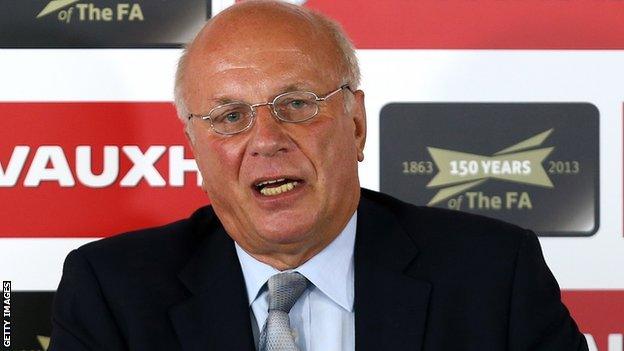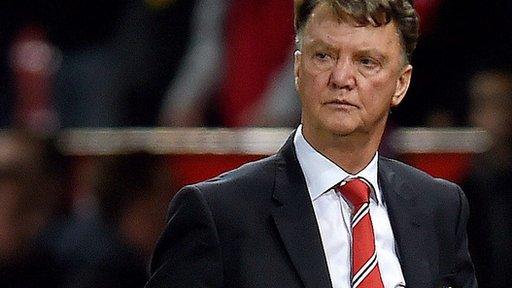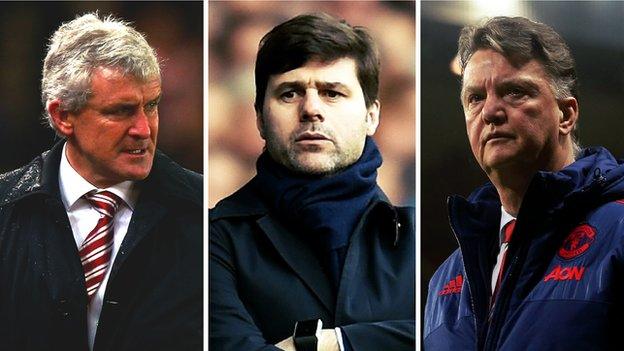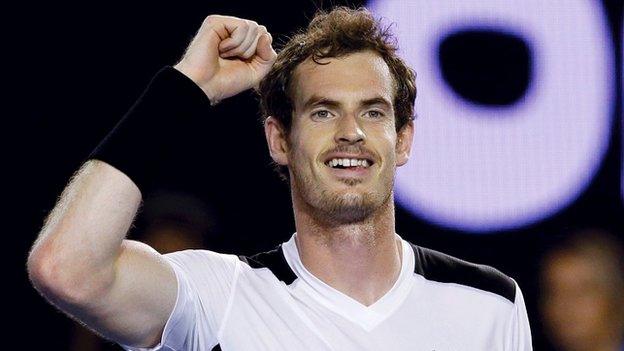Greg Dyke: FA chairman to leave post in June after three years
- Published

Greg Dyke stood down as Brentford chairman to take on the role as FA chairman
Greg Dyke will not seek re-election as Football Association chairman when his term ends in June.
Dyke, appointed in 2013, had intended to stand for a further year.
However, he said that opposition to proposed reforms from some FA councillors and a minority of board members had made him reconsider.
When he succeeded David Bernstein, Dyke, 68, said England should aim to reach the semi-finals of Euro 2020 and win the World Cup in 2022.
He believes football is in a better place financially, administratively and from a coaching standpoint than when he took over in 2013.
However, he said it would be a "fight" to convince the FA Council to see through other "much-needed, significant reform".
Dyke defends cut-throat gesture
In a statement, he added: "I had already decided that if no reform was possible I was going to leave anyway this summer, a position I had shared with a number of colleagues.
"What I now see is that even if we get the reform through, I am probably not the best person to pick up the pieces following the inevitable discord."
Dyke, a former director general of the BBC, has pursued policies aiming at modernising the FA and increasing the number of English players in the Premier League.
He made headlines by making a throat-cutting gesture when England were drawn in the same 2014 World Cup group as Italy and Uruguay.
Earlier this month, Dyke, an outspoken critic of Fifa under Sepp Blatter, said "we should shoot ourselves" if England failed to make it out of the group stages at Euro 2016 in France.
Listen to reaction to Dyke's announcement on BBC Radio 5 live's Football Daily podcast., external
Nothing has changed since 2011 - Bernstein
Berstein said he was "not particularly surprised" by the decision, claiming neither he nor Dyke had made "any substantial change" because pushing reforms through is "extremely difficult".
"I can understand his frustration, which matches my frustration," Bernstein told BBC Radio 5 live Sport.
He suggested only "outside intervention" from the Government or a regulator would make a significant difference.
Dyke targets 2022 World Cup win for England
Analysis - Q&A with Richard Conway
BBC Radio 5 live's sports news correspondent Richard Conway answers questions raised by Dyke's decision.
Q: Why is Dyke frustrated?
A: Back in 2014, Dyke called the FA Council "overwhelmingly male and overwhelmingly white" and believes its members, who are drawn from the professional and amateur ranks of the game, do not represent the modern English game.
However, they help decide major policy issues and a significant number of the 120 that make up the council will lose their positions if the changes being put forward are adopted.
Q: What will happen now?
Dyke has a reputation as a political bruiser.
Given he will now be leaving in June, he may feel liberated to try to push through the changes that he and the majority of the FA board believe are vital without needing to tiptoe around the sensitivities of FA members.
Q: Where does this leave the FA?
A: The FA are prepared for change because Dyke turns 70 in 2017 and would have been forced to step down any way, but this is a period of intense change for the FA.
There have been significant redundancies and cost cutting in an attempt to reshape the organisation's focus and provide the necessary finance for the proposed 150 football hubs due to be built across 30 English cities with FA and government funding.
Q: Who will succeed him?
A: There's no question that Dyke revels in his reputation as being outspoken. He is almost the exact opposite of his predecessor, the quiet and reserved Bernstein.
It's anyone's guess at this stage which direction the FA will seek to go in this time, but they have six months to find his successor.
- Published4 September 2013

- Published28 January 2016

- Published27 January 2016

- Published28 January 2016

- Published20 June 2016

- Published7 June 2019

- Published2 November 2018
